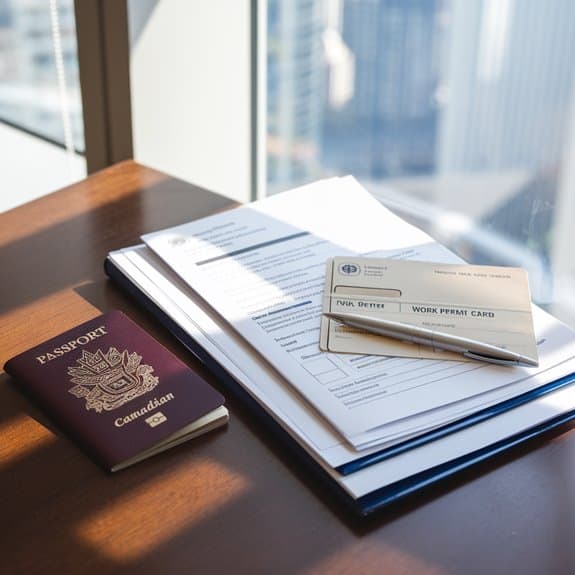
To work legally in Canada, you’ll need either an open work permit or an employer-specific permit. Open permits offer flexibility to work for any employer, while employer-specific permits require a job offer and often a Labour Market Impact Assessment (LMIA). You’ll need to meet eligibility requirements including proof of financial means, clean criminal record, and valid documentation. Understanding the various permit categories, application processes, and permanent residency pathways will help guarantee your successful immigration journey.
Understanding Canadian Work Permit Categories
When maneuvering Canada’s work permit system, it’s essential to understand the two main categories that form its foundation: open work permits and employer-specific work permits.
With an open work permit, you’ll have the flexibility to work for any employer in Canada. These permits are available in specific circumstances, such as for international graduates, spouses of skilled workers, or through particular immigration programs.
Employer-specific work permits, on the other hand, restrict you to working for one designated employer. You’ll need a valid job offer, and your employer typically must obtain a Labour Market Impact Assessment (LMIA) to prove they couldn’t find a Canadian worker for the position.
The permit will specify your employer’s name, work location, and duration of employment.
Eligibility Requirements and Prerequisites
Before applying for a Canadian work permit, you’ll need to meet several key eligibility requirements that vary depending on the type of permit you’re seeking. The basic prerequisites include proving you’ll leave Canada when your permit expires, showing you have enough money to support yourself and your family, and maintaining a clean criminal record. Additional requirements may apply based on your specific situation.
| Requirement Type | What You Need to Show |
| Financial | Proof of sufficient funds |
| Legal Status | Clean criminal record |
| Health | Medical exam if required |
| Job Offer | Valid employment offer with LMIA |
| Documentation | Valid passport and credentials |
You’ll also need to demonstrate that you’ll comply with Canadian laws and meet any job-specific qualifications. If you’re applying for an employer-specific permit, you must have a valid job offer from a Canadian employer who has completed the necessary LMIA process.
The Labour Market Impact Assessment Process
The Labour Market Impact Assessment (LMIA) serves as a fundamental step for many employers looking to hire foreign workers in Canada. If you’re an employer, you’ll need to prove that no qualified Canadian workers are available for the position before hiring internationally.
Before hiring foreign talent, Canadian employers must demonstrate they’ve exhausted all options to fill positions with qualified domestic workers.
To obtain an LMIA, you must first advertise the job position on multiple platforms for at least four weeks and demonstrate your recruitment efforts.
You’ll then submit detailed documentation about the position, including the wage offer, working conditions, and impact on the Canadian labor market. The processing time typically takes 5-12 weeks, though certain high-wage positions may qualify for expedited processing through streams like the Global Talent Stream.
Once approved, your LMIA remains valid for six months and can be used to support a work permit application.
Application Steps and Documentation
Applying for a Canadian work permit involves three main stages: gathering documentation, submitting the application, and completing post-submission requirements.
You’ll need to collect essential documents including your passport, completed application forms, and proof of status in Canada. If applicable, you’ll also need your LMIA and written job offer.
For your application, you must provide your CV, educational credentials, and medical exam results if required.
Don’t forget to include evidence of financial means and proof of fee payment. If you’ve lived in certain countries for more than six months, you may need police clearances.
Remember that Quebec-bound workers need additional documentation through their unique validation process.
Once you’ve gathered everything, you can submit your application online or through paper forms.
Processing Times and Associated Fees
Processing times for Canadian work permits vary considerably based on several factors, including your country of residence, type of permit, and whether you need an LMIA. You’ll need to budget for both time and money when planning your application.
| Permit Type | Processing Time | Fee (CAD) |
| Closed Work Permit | 2-3 months | $155 |
| Open Work Permit | 3-4 months | $255 |
| LMIA Processing | 5+ months | $1,000 |
| Expedited LMIA | 10 business days | $1,000 |
If you’re applying through the Global Talent Stream or other specialized programs, you might experience faster processing times. Remember that additional fees may apply, such as biometrics ($85) or medical exam costs. You should also factor in the time needed to gather all required documentation and complete the application forms correctly.
Family Member Privileges and Rights
When you receive a Canadian work permit, your immediate family members can enjoy several important privileges that make relocating to Canada more feasible.
Your spouse or common-law partner can apply for an open work permit, allowing them to work for any employer in Canada without restrictions.
Your dependent children can attend Canadian public schools without needing a study permit, provided they’re accompanying you to Canada. They’ll receive the same education benefits as Canadian citizens, though some provinces may charge additional fees.
If your children are adults pursuing post-secondary education, they’ll need to apply for a separate study permit.
All family members must obtain proper documentation, including visitor visas or electronic travel authorizations, depending on their citizenship.
Medical Requirements and Health Coverage
Beyond securing privileges for your family members, medical requirements and health coverage represent key aspects of the Canadian work permit process.
You’ll need to undergo a medical exam by an IRCC-designated panel physician if your work involves public health, primary or secondary education, or childcare. The length of your stay may also trigger this requirement.
For health coverage, you’ll find that eligibility varies by province.
While you’re waiting for provincial coverage to begin, you should obtain private health insurance to protect yourself. Most provinces require a waiting period of up to three months before you’re eligible for their healthcare system.
Your work permit doesn’t automatically guarantee health coverage, so it’s crucial to research your specific province’s requirements.
Extending and Maintaining Work Permit Status
Maintaining your legal status to work in Canada requires careful attention to work permit expiration dates and renewal procedures.
You’ll need to apply for an extension at least 30 days before your current permit expires to maintain your work authorization.
When extending your permit, you’ll need to provide updated documentation, including a valid job offer or LMIA if required.
If you’re changing employers, you must apply for a new work permit before starting the new position.
Your extension application should include proof of current status, employment records, and evidence that you’ve complied with previous permit conditions.
If you’ve applied for permanent residency, you may be eligible for a Bridging Open Work Permit to maintain your status while your PR application is processed.
Remember that implied status allows you to continue working while awaiting a decision on your extension application.
Transitioning From Temporary to Permanent Status
Temporary workers in Canada have several pathways to shift to permanent residency, depending on their work experience and qualifications.
You’ll find opportunities through Express Entry, which includes programs like the Canadian Experience Class for those with skilled work experience. If you’re working in a specific province, you might qualify for the Provincial Nominee Program, where provinces can nominate workers who meet their labor needs.
The Atlantic Immigration Program offers another route if you’re working in Nova Scotia, New Brunswick, Prince Edward Island, or Newfoundland and Labrador.
While you’re pursuing permanent residency, you can apply for a Bridging Open Work Permit to maintain your work status.
Each pathway has specific requirements for language proficiency, work experience, and education that you’ll need to meet.
Common Application Mistakes to Avoid
When applying for a Canadian work permit, you’ll need to carefully avoid several critical mistakes that could delay or derail your application process.
Don’t submit incomplete application forms or provide inadequate supporting documents, as these are common reasons for rejection. Confirm you understand whether your job offer requires a Labour Market Impact Assessment (LMIA) before applying.
You’ll also want to verify that you’re applying under the correct visa category and have included proof of financial stability.
Double-check that your job offer information matches your application details exactly. Pay attention to medical and security requirements, and submit your application with enough time to account for processing delays.
If language proficiency is required for your position, make sure you’ve included the necessary documentation.
How Canadian Currents Immigration Can Help
The experienced professionals at Canadian Currents Immigration can guide you through every step of the work permit application process.
Our team includes immigration lawyers, consultants, and paralegals with decades of combined expertise in immigration law. We’ll work directly with you to understand your specific needs and create a tailored strategy for your situation.
Expert immigration professionals work collaboratively with clients to develop customized strategies based on years of specialized legal experience.
You’ll benefit from our efficient, cost-effective legal services as we help you navigate complex immigration requirements.
Whether you’re applying for an open work permit, employer-specific permit, or exploring pathways to permanent residency, we’ll guarantee your application is complete and accurate.
Our team will review your documentation, advise you on requirements, and help you avoid common application mistakes that could delay or derail your work permit process.
Frequently Asked Questions
Can I Start a Business While on a Work Permit in Canada?
You’ll need specific authorization to start a business on your work permit. It’s not allowed on standard closed work permits, but open work permits may give you this flexibility.
What Happens to My Work Permit if My Employer Goes Bankrupt?
If your employer goes bankrupt, you’ll need to apply for a new work permit since your current one becomes invalid. You can search for another employer or explore open work permit options.
Can I Work Remotely for a Foreign Company on a Canadian Permit?
You’ll need to check your work permit conditions carefully. If you have an open work permit, you can work remotely, but employer-specific permits typically don’t allow foreign employment.
Are There Tax Implications for Working Overtime on a Temporary Permit?
You’ll need to pay income tax on all overtime earnings at your regular tax rate. Overtime doesn’t affect your work permit status, but you must declare all income to Canadian authorities.
How Does Maternity Leave Affect My Work Permit Status in Canada?
Your work permit stays valid during maternity leave, but you’ll need to guarantee your permit won’t expire during your leave. You’re entitled to Employment Insurance benefits while on leave.
Conclusion
You’ve now learned the essential aspects of obtaining and maintaining a Canadian work permit. Whether you’re pursuing a closed or open permit, understanding the requirements, costs, and processes is vital for your success. By following proper procedures, avoiding common mistakes, and staying informed about your obligations, you’ll be better positioned to work legally in Canada and potentially shift to permanent residence.als can help you navigate the system effectively and move forward with your immigration goals.

We serve ALL of Canada. Currently have offices Western Canada — Vancouver, Calgary, Edmonton, Kamloops and Red Deer. We also have the infrastructure to work with any of our clients virtually — even from the furthest regions of the Yukon to Newfoundland.
Call (778) 331-1164 [toll free 1 (844) 715-0940] to get routed to the best office for you or contact us online to schedule an appointment.
We also have a dedicated intake form to help you get the ball rolling. Our intake team will review your specific case and advise you on the next steps to take as well as what to expect moving forward.
Our offices are generally open 8:30 a.m.—4:30 p.m., Mon—Fri.

Aleksandra Koscielak
IMMIGRATION CONSULTANT
With an exceptional record of success in immigration consulting and business strategy, Aleksandra brings extensive expertise as a senior licensed immigration consultant. Her deep understanding of business strategies and processes enables her to advise executives on the best immigration solutions confidently.



